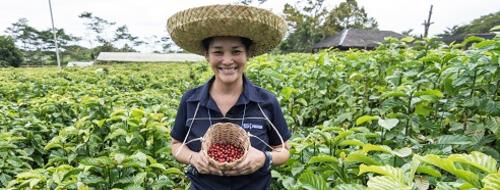Nestlé Statement on Greenpeace Brand Audit
26 September 2017
We share the Greenpeace ambition that no plastic waste should end up discarded in the environment, particularly in our rivers and oceans.
In compliance with Philippine laws on solid waste management, we sustain environmental programs that avoid and/or reduce waste, segregate at source, reuse and recycle materials and compost bio-degradable waste as well as convert residual waste to alternate fuel. We would like to clarify that we do not believe that incineration is an acceptable long-term end-of-life solution for used plastic packaging. However, we recognize that in specific situations where there is a current absence of available and scalable technologies, energy recovery may be the only viable recovery option available in the short-term. In line with our operational approach as a business, we fully support the development of available and emerging recovery technologies in the Philippines, which are both environmentally sound and legally compliant.
As part of our ongoing efforts to reduce our environmental footprint, in 2016, Nestlé Philippines achieved zero waste to landfill across all our factories. While we are proud of this achievement, we also recognize that we are at the beginning of our journey. Going beyond our factories and sites, we are actively working on a range of initiatives spanning the complete life cycle of our products and their packaging. Plastic packaging plays an important role in safely delivering food and drinks to consumers. We believe that with the right approach, we can utilize packaging which keeps our products safe, while enabling them to be collected or recycled without detrimental impact to the environment. This is why we are continually exploring ways to find packaging alternatives, which ensure food safety without compromising our environmental ambitions to reduce, reuse and recycle.
As we explore packaging alternatives, we continue to implement programs that promote better solid waste management across the life cycle of our products. These programs focus on the complete “life cycle” of our products, from design to consumption, collection and processing:
Research and Development. Our Nestlé research and development centers globally look into innovative packaging designs using alternative materials in order to develop safe and cost-efficient packaging for easier recycling. Through the years, we have adopted a number of these innovations to reduce our packaging materials in the Philippines.
Packaging reduction. Since 1993, Nestlé Philippines has embarked on a continuing program to reduce the amount of packaging materials that we use for our products, consistently meeting, if not exceeding our annual target of packaging material reduction by 1,000 MT or 1 million kilograms of packaging materials.
Collection and Recycling of Used Packaging. We support initiatives that recover and recycle plastics and laminates, particularly to prevent them from contaminating natural habitats.
Eco-Bricks - In partnership with local government units and Green Antz Builders, Inc. we have embarked on an eco-brick project which converts laminates to eco-bricks and pavers. Together with our partners, we are expanding these eco-bricks hubs to at least five areas across the Philippines in 2017. Aside from collecting laminates and converting these to bricks, the program also generates livelihood for communities.
Tibay Chairs - Laminates are also converted to school chairs (called Tibay chairs) that are used by public schools across the country.
Education. We recognize that effective solid waste management is a shared responsibility, so we work with stakeholders to improve recycling and recovery rates as well as encourage consumers to dispose waste plastic properly. Since 2013, we have been conducting solid waste management workshops for various communities, sharing with school teachers, students, local government units, environmental authorities, and residents of communities the proper way of managing solid wastes.
Industry Action. We are active participants of PARMS (Philippine Alliance for Recycling and Materials Sustainability) which is a non-stock, non-profit organization consisting of corporate members, industry associations, government and non-government organizations and recyclers with the objective of leading the development of solid waste management solutions in the Philippines. The organization is pooling resources to implement major solid waste management projects in the Philippines.
Engaging Business Partners. Through our long running Greening the Supply Chain program, we have, for the past 17 years, helped our suppliers, co-manufacturers, transport providers, distribution center operators and distributors establish their own solid waste management systems. We hold regular environmental fora with them and conduct visits to their facilities so we can share best practices to improve their environmental and solid waste management.
We thank Greenpeace for taking the time to meet with us in the morning of September 22, when we presented to Ms. Abigail Aguilar our environmental initiatives on solid waste management. We welcome continued discussions with Greenpeace, including the sharing of any resource or existing research that Greenpeace may provide on more efficient packaging solutions, so we may together find alternative innovative packaging that is safe, affordable and accessible to Filipino consumers.
We look forward to making further progress in collaboration with all environment stakeholders from local government to non-government organizations, industry partners, and consumers to enhance the design, responsible use and disposal of plastics in the Philippines.
